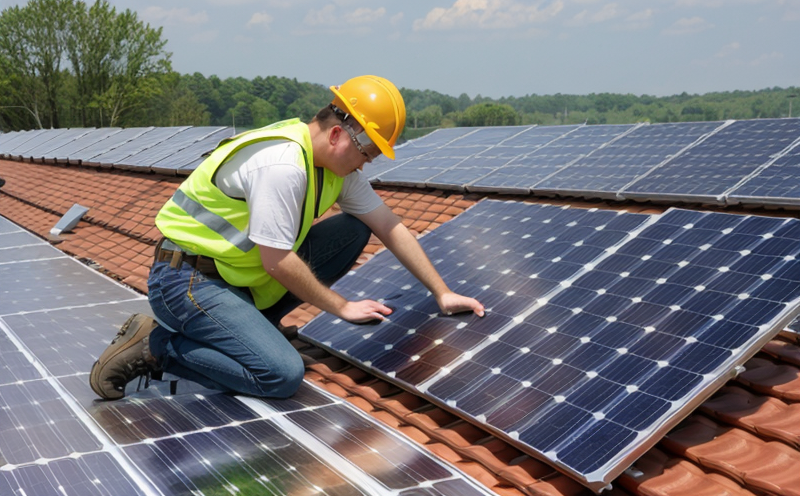Testing and standards are crucial components of the solar energy industry, ensuring that solar panels and other equipment meet specific requirements for performance, safety, and durability. In this article, we will delve into the world of testing and standards for solar energy, covering various aspects of the industry.
Overview of Solar Energy Testing and Standards
The solar energy industry relies heavily on rigorous testing and standardization to ensure that products meet specific criteria. The primary goal is to guarantee that solar panels and other equipment perform as expected, providing reliable power generation and minimizing risks associated with their use. To achieve this, several organizations, such as the International Electrotechnical Commission (IEC), the National Renewable Energy Laboratory (NREL), and the International Organization for Standardization (ISO), develop and maintain standards for solar energy products.
Solar Panel Testing Standards
Solar panels undergo various tests to assess their performance and reliability. These tests include:
I-V Curve Tracing: This test measures a panels current-voltage characteristics under different conditions, such as light intensity and temperature. The I-V curve tracing helps determine the maximum power point (MPP) of the panel, which is essential for achieving optimal energy production.
Flash Testing: Flash testing involves rapidly switching a high-intensity light source on and off to simulate real-world operating conditions. This test evaluates a panels response to changing light intensities and its ability to recover from temporary exposure to intense radiation.
Certification and Compliance
To ensure compliance with standards, manufacturers must obtain certifications for their products. The most widely recognized certification is IEC 61730, which covers the safety requirements for photovoltaic (PV) modules. To comply with this standard, manufacturers must meet specific criteria for design, manufacturing, testing, and documentation.
Quality Control Measures
Manufacturers implement various quality control measures to ensure compliance with standards. These measures include:
Incoming Material Inspection: Regular inspection of raw materials and components ensures that they meet the required specifications.
Process Control: Manufacturers monitor and control production processes to minimize defects and deviations from standard procedures.
Final Product Testing: Rigorous testing of finished products, including performance and safety evaluations, verifies compliance with standards.
Field Performance and Maintenance
After installation, solar panels continue to be tested for field performance. Regular inspections and maintenance ensure that panels operate within expected parameters. Field performance assessments include:
Power Output Monitoring: Continuous monitoring of power output helps identify any deviations from the panels rated capacity.
Fault Detection: Advanced diagnostic tools detect potential faults or anomalies in panel operation.
QA Section
Q: What is the significance of testing and standards for solar energy products?
A: Testing and standards ensure that solar panels and other equipment meet specific requirements for performance, safety, and durability. This guarantees reliable power generation, minimizing risks associated with their use.
Q: Which organizations develop standards for solar energy products?
A: Organizations such as the International Electrotechnical Commission (IEC), the National Renewable Energy Laboratory (NREL), and the International Organization for Standardization (ISO) develop and maintain standards for solar energy products.
Q: What is IEC 61730, and what does it cover?
A: IEC 61730 is a standard that covers the safety requirements for photovoltaic (PV) modules. It includes design, manufacturing, testing, and documentation criteria to ensure compliance with international safety standards.
Q: How do manufacturers implement quality control measures?
A: Manufacturers implement various quality control measures, including incoming material inspection, process control, final product testing, and regular monitoring of production processes.
Q: What are the benefits of obtaining certifications for solar energy products?
A: Obtaining certifications, such as IEC 61730, demonstrates compliance with international standards. This enhances consumer confidence, reduces liability risks, and increases market competitiveness.
Q: How do manufacturers ensure compliance with field performance requirements?
A: Manufacturers implement regular inspections and maintenance to ensure that solar panels operate within expected parameters. Field performance assessments include power output monitoring, fault detection, and advanced diagnostic tools.
Q: What are some common testing methods for solar panels?
A: Common testing methods for solar panels include I-V curve tracing, flash testing, thermal stress testing, and environmental chamber testing.
Q: Can you explain the importance of temperature testing in evaluating a solar panels performance?
A: Temperature testing evaluates a solar panels response to changing temperatures. High temperatures can degrade panel efficiency, while low temperatures can reduce power output. Manufacturers must ensure that their panels perform within expected parameters across various temperature ranges.
Q: What role does ISO play in the development of standards for solar energy products?
A: ISO is involved in developing and maintaining standards for solar energy products, ensuring compliance with international safety requirements.

































